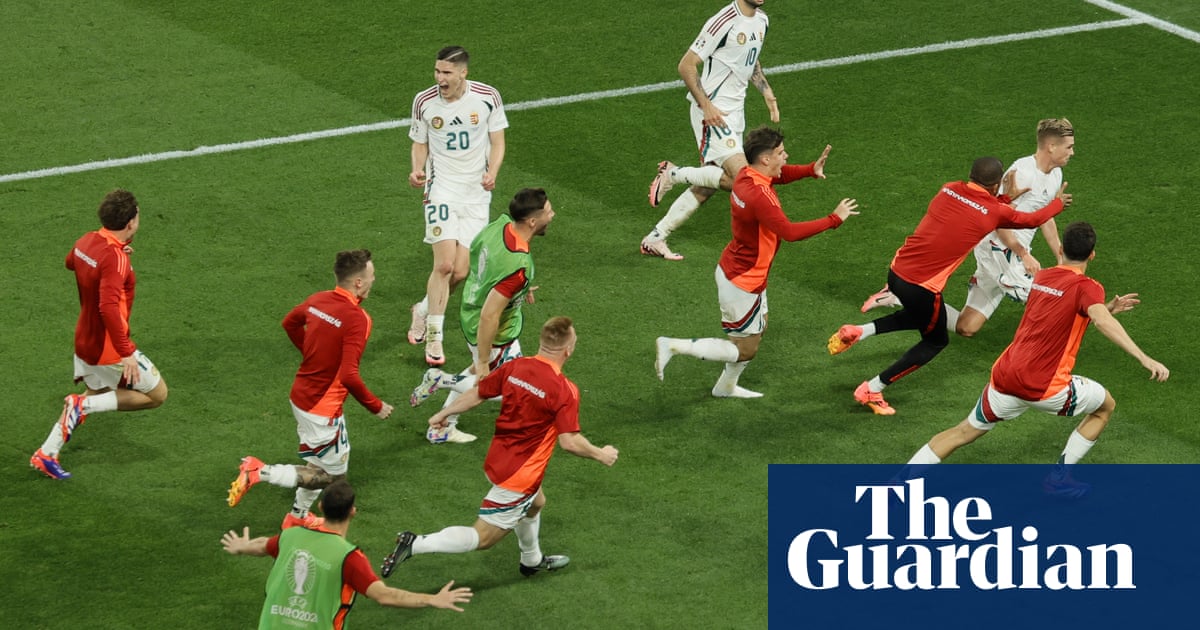Scotland needed a win to secure a spot in the knockout phase of a major tournament for the first time, save some form of arithmetic cruelty. Hungary had faint hopes of progression with a win. The teams looked destined to play out a mutually unsatisfactory, ragged scoreless draw until Hungary notched a 100th minute winner. Put bluntly, neither team deserves a place in the last 16 of Euro 2024 based on this.
Scotland huffed and puffed. Hungary’s play generally broke down 25 yards from goal. Steve Clarke and the Tartan Army will be wounded by what transpired here but the harsh reality is over the course of three games they have looked short. Scotland are out of the Euros, a point feeling scant reward for weeks of effort.
This match, however, may become remembered for the scenes involving Hungary’s Barnabas Varga. The forward was in obvious distress and was treated on the field with sheeting around him after taking a bad fall when trying to meet a cross in the 71st minute.
Varga landed horribly. The incident dulled the atmosphere in the closing stages. He was seen in the recovery position as he exited the field. About 10 minutes after the final whistle a statement from the Hungarian Football Federation said: “Barnabas Varga’s condition is stable. The Ferencvaros player is currently in one of the hospitals in Stuttgart. We will inform you immediately if there is any news about his status.”
It is always easy to overegg these occasions on the basis of recency bias. Yet this felt a genuinely significant moment for Scottish football. This was not simply because a team could march to where their predecessors could not but because there was legitimate belief around that scenario. This Scotland setup has captured hearts and minds. It has raised the bar. Now it had to deliver.
This fixture was different to the previous two in Group A for Scotland because they could – and needed to – exert control. Germany trampled all over Clarke’s team. Switzerland looked technically superior to the Scots during their 1-1 draw. Hungary are ranked higher than Scotland in the world and had enjoyed terrific pre-tournament form but this was an opportunity for those in navy blue to show they can play on the front foot. Scotland dominated the ball in the early exchanges before being warned of Hungary’s counterattacking menace as Angus Gunn scrambled away a long range shot from Bendeguz Bolla.
Clarke had kept the faith. He made just one change from the team who drew with the Swiss, that an enforced one as the injured Kieran Tierney was replaced by Scott McKenna. Marco Rossi, the Hungary manager, restored Barnsley’s Callum Styles to his midfield. His first intervention was to earn a booking for clobbering John McGinn. The ability of McGinn to win foul after foul was the most striking aspect of the first quarter. Otherwise, this was as taut and tense as it had been reasonable to expect. Scotland had nerves as an excuse for their lack of quality in the final third but Hungary should surely have been more free-spirited given their predicament. The next player to flatten McGinn, Willi Orban, saw yellow.
Scotland’s problem by the half hour remained a lack of cutting edge despite possession statistics topping 70%. Roland Sallai had no such issues; the Hungary forward left Jack Hendry writhing in agony after standing on his chest. The Argentinian referee, Facundo Tello, deemed this an accident, which seemed fair enough.
The next stray boot almost triggered the opening goal. Ché Adams had been penalised for dangerous play, with Dominik Szoboszlai floating the resultant free-kick deliciously to the back post. Orban headed narrowly over. The VAR may have deemed Orban offside but Scotland had been reminded of Szoboszlai’s creativity. Andras Schafer was duly far more lucky than Orban to escape a red card after catching Hendry’s ankle with a late challenge.
after newsletter promotion
The second period had to provide improvement. Didn’t it? A tournament laced with exciting matches was suddenly bearing witness to a grim slog. At some stage, it seemed reasonable to assume the shackles had to come off two teams for whom three points were essential. Even a shot at goal would constitute progress from the Scots. It arrived in the 53rd minute, Adams blazing over from 18 yards. Scotland’s lack of potency had been similarly evident against the Swiss and Germans, hence two wild deflections from defenders had constituted their scoring tally. It is overly simplistic to blame Clarke for this; Scotland do not have much, if anything, by way of game-changing threat in their ranks.
Varga had leapt for a free-kick before the halt in play and obvious concern from teammates and opposition alike. Sheeting was still around the Hungary player as he was removed from proceedings.
The Hungarian contingent had also displayed anger at how long it took medics to arrive on the field. Clarke threw on what forward options he had as Scotland tried to snatch a precious lead. Lawrence Shankland, Stuart Armstrong and Ryan Christie entered the fray.
Armstrong’s first involvement saw him appeal in vain for a penalty.Ten minutes of added time was the result of the Varga situation. As the board was raised, Gunn saved smartly from Szoboszlai. Kevin Csoboth hit a Scotland post. . From the final counter, Csoboth flicked home. Bedlam for Hungary. Scotland were crushed.







